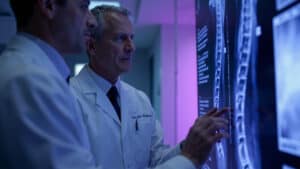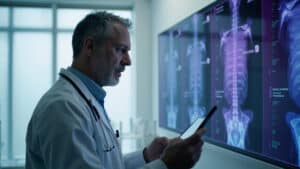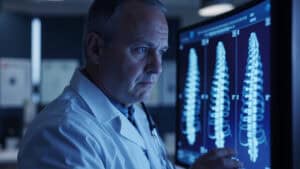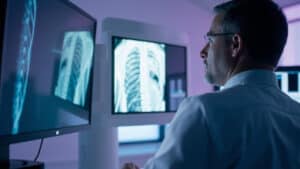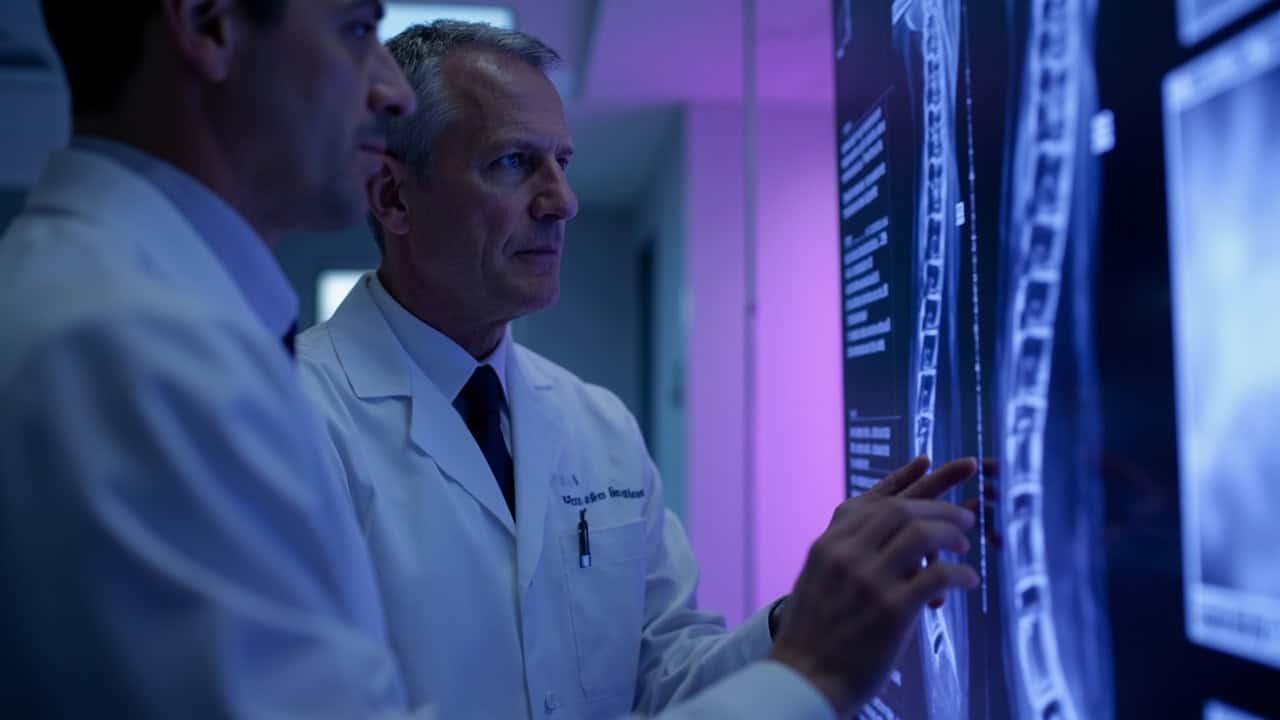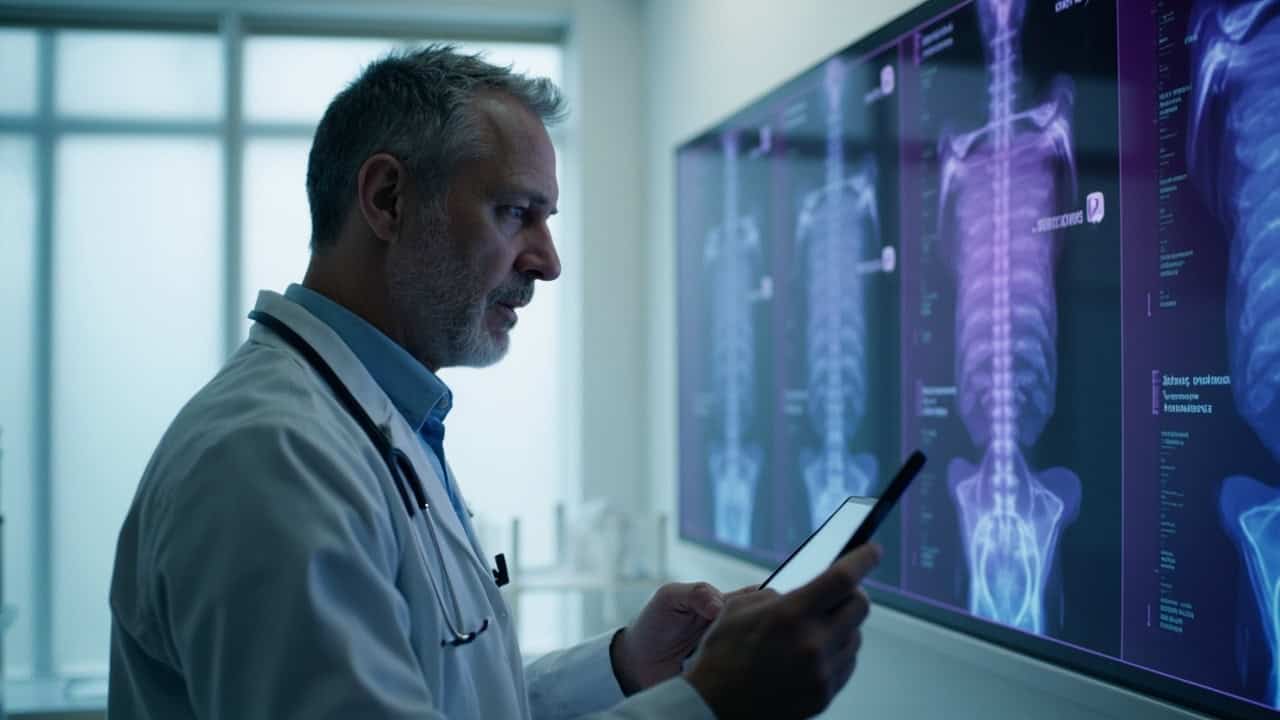Muscle Relaxants For Herniated Disc Relief: A Physician’s Proven Approach
Written by Dr. Matthias Wiederholz, MD, Quadruple Board-Certified Non-Surgical Spine & Regenerative Medicine Expert
Quick Insights
Muscle Relaxants For Herniated Disc Relief are medications that help ease painful back spasms by calming tense muscles caused by disc irritation. They offer fast, short-term symptom relief and are recommended by medical experts for acute flare-ups—not as long-term cures.
Key Takeaways
- Muscle relaxants work on your nervous system, aiming to reduce muscle spasms triggered by herniated discs.
- Methocarbamol delivers symptom relief for many disc pain patients with lower risk than older alternatives.
- Most muscle relaxants provide only temporary comfort, not true disc healing or long-term relief.
- New research suggests regenerative treatments may outperform medication alone for lasting improvement.
Why It Matters
Living with a herniated disc means pain can interrupt your work, hobbies, and daily movement—sometimes suddenly. Understanding how muscle relaxants fit into real recovery empowers you to seek faster relief and discover advanced options designed to return you quickly to your active life.
As a quadruple board-certified interventional pain and regenerative medicine specialist, I understand the frustration that muscle spasms from a herniated disc can bring—especially when they interrupt your busy, active life in Houston.
Muscle Relaxants For Herniated Disc Relief are medications prescribed to rapidly decrease painful back or neck spasms caused by disc irritation. These muscle relaxants, like methocarbamol or cyclobenzaprine, offer acute relief by calming muscle tension, but they are designed mainly for short-term symptom management and don’t address the root disc problem.
My clinical experience—and the broader research—has shown that while muscle relaxants can be beneficial in the early phases of disc flare-ups, they are rarely a long-term solution. In fact, clinical research demonstrates that these medications provide moderate relief for most patients with disc-related pain and spasms, but the impact is temporary and not curative.
If you want to stay active, avoid invasive surgery, and truly restore your mobility, understanding all your options is essential—including advanced options like regenerative treatment for back pain.
Learn more about Dr. Matthias Wiederholz’s expertise and approach here.

What Are Muscle Relaxants for Herniated Disc Relief?
Muscle relaxants for herniated disc relief are prescription medications formulated to ease the intense muscle spasms that can occur when a spinal disc presses on or irritates nearby nerves. These drugs—often called skeletal muscle relaxants—primarily act on the central nervous system. By reducing involuntary muscle tightness, they offer relief during sudden flare-ups, helping you regain some comfort and functionality.
How Muscle Relaxants Work
Muscle relaxants such as methocarbamol (a newer generation medication) and cyclobenzaprine (also known as Flexeril) interrupt nerve signaling that causes muscles to spasm and contract painfully around an injured disc. The goal is to break this cycle of spasm and allow you to move more freely.
In my practice, I frequently encounter patients who have spent years exploring treatments—from surgeries to pain medications—without achieving meaningful relief. Often, they are unaware that minimally invasive regenerative solutions like Discseel® can effectively restore their spine health.
Discseel® Procedure reviews and back pain relief
Many Houston patients are initially surprised by how quickly muscle relaxants can diminish spasm pain after a herniated disc. However, it’s critical to understand that these drugs only address surface-level symptoms—they don’t heal the disc or fix the structural problem beneath.
For more about cervical disc symptoms, read Symptoms of Bulging Disc in Neck C5-C6.
Short-Term Symptom Management
Muscle relaxants are most beneficial when used for acute pain episodes—typically for several days up to two weeks—during the most severe part of a flare. In these situations, the medications may provide enough symptom reduction to let you get mobile sooner, participate in gentle stretching exercises, or sleep more comfortably.
As a quadruple board-certified regenerative medicine specialist, I’ve observed that the precision of matching a patient’s spinal condition with advanced, targeted treatments like Discseel® significantly enhances their outcomes.
Learn more in Everything You Need to Know About New Treatments for Ruptured Discs.
These medications are not recommended for chronic, ongoing use due to diminishing effectiveness and potential side effects. Instead, they serve as a stepping stone—helping you regain function while we look for longer-lasting solutions that directly repair the disc itself.
If you’re struggling with a sudden, severe spike in pain or muscle tightness, a brief course of a muscle relaxant may help you get “over the hump.” Still, for sustainable relief, addressing the root cause—not just masking symptoms—is the true path to stronger, healthier movement.
More on holistic care in Comprehensive Guide to L5-S1 Bulging Disc.

Do Muscle Relaxers Help With Herniated Discs?
Do muscle relaxers help with herniated discs?
Muscle relaxers offer short-term, moderate relief from muscle spasm and acute pain triggered by herniated discs—but they do not heal the disc or provide lasting results. Government clinical summaries confirm these medications help ease symptoms quickly, but the benefit tends to be temporary and best limited to flare-ups. [NCBI clinical overview]
Pros of muscle relaxers:
- Rapid comfort for severe spasm or cramping
- Ability to return to daily tasks or therapy faster
- Better sleep during flare-ups
Cons:
- Only treats symptoms, not the disc itself
- Not a long-term fix—relief fades as medication is stopped
- Risk of sleepiness, dizziness, or dependence
Research Highlights
Published research indicates that methocarbamol and similar agents provide effective relief for many patients with disc-related spasms. In one clinical series, nearly all patients experienced “moderate or pronounced” decreases in pain and muscle tightness, with only a few reporting mild side effects like dizziness or nausea (StatPearls pain relief findings).
A comprehensive review of randomized controlled trials affirms that while muscle relaxants help manage acute symptoms, they rarely outperform other conservative treatments for long-term recovery (RCT outcome analysis). In most studies, any improvement was modest and temporary—underscoring the need to look beyond medication if you want durable results.
Delve further into disc-specific pain at L5-S1 Pain and Its Causes, Symptoms, and Treatment.
Effectiveness for Acute Flare-Ups
Having personally performed over 10,000 regenerative spine procedures, I’ve consistently witnessed that truly restoring function and alleviating chronic pain involves not just clinical excellence, but a deep emotional and functional understanding of each patient’s needs.
For emergency signs, review Emergency Symptoms of a Herniated Disc.
When a patient is nearly immobilized by intense back spasms or cannot begin physical therapy because of pain, a carefully chosen muscle relaxant can be the key that allows short-term recovery and resets the path toward healing. For Active Alex and others hoping to stay mobile and active in Houston, muscle relaxants can be a helpful—but incomplete—tool in the journey.
When to Seek Urgent Help
If you experience sudden loss of bowel/bladder control, major leg weakness, or numbness between your legs (“saddle anesthesia”), contact a physician immediately—these may signal a rare, serious nerve injury.
Types of Muscle Relaxants Used for Herniated Disc Pain
There’s no universal “best muscle relaxer”—the ideal option depends on your medical history, other medications, and previous responses. I tailor each prescription to maximize benefit and minimize side effects.
Explore alternatives in Best Painkiller for Herniated Disc.
Methocarbamol
methocarbamol (brand example: Robaxin) is often favored for herniated disc flare-ups because research shows it delivers reliable symptom relief for most patients without the pronounced drowsiness associated with first-generation drugs like carisoprodol. In a study of patients with disc-related pain, all but a handful reported moderate or significant improvement in spasm severity, with only minor and reversible side effects (methocarbamol efficacy and risk data).
Cyclobenzaprine (Flexeril)
cyclobenzaprine (Flexeril) is a well-known muscle relaxant that acts on nerve pathways to decrease muscle contraction. While it’s effective for many, side effects like drowsiness can limit tolerance—especially for those who need to remain alert for work or driving. Get insights on Cyclobenzaprine for Herniated Disc.
Baclofen and Others
baclofen and agents such as tizanidine may be considered when first-line options are insufficient, or when spasticity is particularly stubborn. These medications alter central nervous system activity, but can increase sleepiness and, in some cases, require slow tapering to prevent withdrawal symptoms.
According to recent research, medications like these have a role in symptom control for cervical disc herniations as well, though always as part of a broader rehabilitation plan—not as the endpoint (cervical herniation management). For cervical details, read Cervical Herniated Disc: Symptoms and Treatment.

Risks, Safety, and Side Effects
Muscle relaxants for herniated disc relief carry real, though generally manageable, risks. Awareness of side effects and contraindications is vital to safe, effective use.
For a guide to disc tear treatment, check Disc Tear Treatment: Restoring the Integrity of Your Spine.
Common Adverse Effects
- Drowsiness or excessive sleepiness
- Dizziness or feeling unsteady
- Nausea, mild digestive upset
Most patients experience only mild, short-lived side effects that resolve when the medication is stopped. However, even these temporary issues can be problematic—especially if your job or lifestyle demands sharp focus.
Dependency Risk
Long-term or unnecessary use of muscle relaxants can lead to dependence—or, less often, withdrawal symptoms after stopping. For these reasons, published clinical guidance recommends using the lowest effective dose for the shortest possible duration, only when other pain relievers (like NSAIDs) haven’t been enough.
Muscle relaxants are not a substitute for active recovery or root-cause repair of your disc problem.
For additional information, visit Treatments for Disc Desiccation.
Who Should Avoid Muscle Relaxants?
Avoid these medications—or use extreme caution—if you:
- Have struggled with substance misuse
- Face severe liver or kidney disease
- Must drive or operate machinery for work
- Take medications with sedative effects
In my practice, thorough screening ensures you avoid preventable complications. If you’re ever uncertain about interactions or safety, your provider should welcome open, thoughtful discussion.
For more on side effect profiles, see the detailed governmental NCBI StatPearls summary.
For anatomy context, explore Understanding S1 Nerve Distribution: Anatomy, Symptoms, and Treatment.
Beyond Medications: Regenerative Treatments and Discseel®
If you’re ready to shift from symptom patching to true healing, regenerative treatments like Discseel® offer hope for long-term mobility and pain relief.

Discseel® Procedure Overview
The Discseel® Procedure is a revolutionary, minimally invasive approach that repairs spinal discs using biologic fibrin—directly targeting the source of pain. Unlike muscle relaxants, which simply mute symptoms, Discseel® helps seal and regenerate the damaged disc. Performed in-office under local anesthesia, this procedure offers a fast recovery—most of my Houston patients return to daily activity within days.
In my practice, I frequently meet patients who have cycled through medications, injections, and even failed surgeries before learning that non-surgical options like Discseel® might restore their disc’s structure and function—without hardware or hospitalization.
For herniation treatment details, see Effective Treatment Options for L5-S1 Disc Herniation Pain.
Discseel® vs. Traditional Treatments
Recent meta-analyses and randomized studies illustrate a key limitation of conservative therapies—like muscle relaxants or steroid injections. Most provide only partial, short-lived relief (analysis of nonsurgical outcomes; meta-analysis summary). By contrast, regenerative procedures—notably Discseel®—have shown far better long-term results, especially when compared to ongoing medication use or risky surgeries (PRP/regenerative outcomes study).
As a quadruple board-certified regenerative spine specialist and one of the few master instructors personally trained by Discseel®’s inventor, I offer these advanced therapies to Houston and New Jersey patients seeking to finally heal, not just cope.
Why Trust Performance Pain & Sports Medicine in Houston?
Choosing the right guide for your spine care journey can make all the difference.
About Dr. Matthias Wiederholz
At Performance Pain & Sports Medicine, I blend academic expertise and concierge-level attention. With over 10,000 minimally invasive procedures completed, quadruple board certifications, and direct mentorship by Dr. Kevin Pauza (Discseel®’s inventor), my team and I deliver what other clinics can’t: truly personalized, mastery-driven care for Houston.
Learn more about my background & credentials.
Concierge Approach & Patient Outcomes
Unlike larger clinics where patients may rarely see the same provider, I personally oversee each patient’s progress from evaluation through advanced regenerative therapy and long-term recovery.
Recent research finds that most non-surgical treatments fall short for persistent back pain (meta-analysis of conservative efficacy). That’s why, when medications and physical therapy can’t deliver lasting relief, I prioritize innovation—using regenerative care proven to restore function and get you moving again.
You don’t have to travel far for breakthrough spine care. As one of the only certified Discseel® providers and master instructors in Houston, I bring national-level innovation to your neighborhood—so you get advanced solutions close to home.
Frequently Asked Questions (FAQ)
Do muscle relaxers cure a herniated disc?
No—muscle relaxants only mask symptoms such as spasm and pain; they do not repair, shrink, or heal the injured disc (government research summary). For healing, consider regenerative options that target the disc itself.
Can I drive or work after taking muscle relaxants?
Use caution. Since many muscle relaxants cause sleepiness or slowed reaction time, driving or operating machinery may not be safe (medication side effect guidance). Check with your physician about your specific medication and job requirements.
How long should I take muscle relaxants for a herniated disc?
For most adults, these medications should only be used for a few days to two weeks during an acute episode (systematic review guidance). Longer use increases risk without improving outcomes.
Are regenerative treatments like Discseel® right for me?
If you have chronic disc pain, recurrent flare-ups, or have failed other therapies, Discseel® and similar regenerative solutions can offer long-term relief not found with medications alone (comprehensive outcomes study). Schedule a consultation to assess your candidacy.
What’s the recovery like after Discseel®?
Most patients return to light activities within days and resume full movement sooner than after traditional spinal surgery. No hospital stay or large incisions are needed.
Why choose a Houston-based Discseel® provider?
Choosing a local master instructor means direct access to top-tier expertise—plus the convenience of in-town care, personal follow-up, and greater accountability with your outcome.

Patient Success Story: Real Relief in Houston
Patient experiences are at the heart of my approach to spine care. Hearing directly from those who have walked this journey helps me continually refine and personalize each treatment plan.
I recently received feedback that captures what we aim to provide at Performance Pain and Sports Medicine. This reviewer shared their experience after receiving an injection for back pain:
“The support staff that Dr.Wiederholz has is amazing everyone was supportive. After I received the injection for my back pain, he was correct, I feel so much better. I would recommend this facility. Thanks again!”
— Steven
Read Steven’s testimonial on Google.
Steven’s words reflect the supportive environment and real relief we strive to deliver. His experience underscores the importance of compassionate care and evidence-based solutions for herniated disc pain. Explore more patient-focused advice in Managing L4-L5 Pain: Symptoms.
Muscle Relaxants For Herniated Disc Relief in Houston, TX
Living in Houston means dealing with a fast-paced lifestyle, and back pain from a herniated disc can quickly disrupt your daily routine. The city’s active community and diverse workforce often require rapid, effective solutions to keep you moving.
At Performance Pain and Sports Medicine, I see many Houstonians who need both immediate relief and long-term answers. Muscle relaxants for herniated disc relief can provide short-term comfort, especially during acute flare-ups, allowing you to return to work or family activities sooner.
However, Houston’s unique access to advanced regenerative treatments—like the Discseel® Procedure—means you don’t have to settle for temporary fixes. As the first physician in Houston to offer this innovative, non-surgical option, I’m committed to helping local patients achieve lasting results without invasive surgery.
If you’re in Houston and struggling with disc pain, schedule a consultation to explore both immediate and long-term solutions tailored to your needs. Your path to pain relief and restored mobility can start right here in your own city.
Conclusion
Muscle Relaxants For Herniated Disc Relief can offer short-term comfort during acute flare-ups, but they are not a long-term solution for active individuals who want to reclaim their lifestyle. My experience as a quadruple board-certified regenerative spine specialist has shown that true recovery comes from addressing the root cause—not just masking symptoms. Advanced regenerative care, without invasive surgery, is now available right here in Houston, giving you the chance to return to the activities you love.
If you’re ready to move beyond temporary fixes and want to see if you qualify for the Discseel® Procedure, I invite you to see if you are a candidate for the Discseel® Procedure—schedule your consult today. Your journey to lasting relief and restored mobility can start close to home, with care from a nationally recognized, quadruple board-certified physician.
This article is for educational purposes only and should not be used as a substitute for professional medical advice, diagnosis, or treatment. Always seek the advice of your physician or other qualified healthcare provider with any questions you may have regarding a medical condition or treatment options. Never disregard professional medical advice or delay in seeking it because of something you have read in this article.
Contact us to get started on your relief journey.
Frequently Asked Questions
Do muscle relaxants for herniated disc relief actually fix the disc problem?
No, muscle relaxants only provide temporary relief from muscle spasms and pain caused by a herniated disc. They do not repair or heal the disc itself. These medications are best used for short-term symptom management while you and your physician explore more lasting solutions.
For disc healing options, check What Is Disc Desiccation.
Where can I find advanced, non-surgical herniated disc treatment in Houston, TX?
You can find advanced, non-surgical options like the Discseel® Procedure at my practice in Houston. I offer personalized, regenerative spine care designed to help you avoid surgery and return to your active lifestyle. Most patients can schedule a consultation within 1–2 weeks for a thorough evaluation and tailored treatment plan.
As an active professional, how do I know if muscle relaxants are right for my herniated disc pain?
If you’re experiencing sudden, severe muscle spasms that limit your movement, a short course of muscle relaxants may help you regain function quickly. However, for ongoing or recurrent pain, I recommend discussing regenerative treatments that address the underlying disc issue. This approach has helped many of my patients return to work and daily activities with lasting relief.






